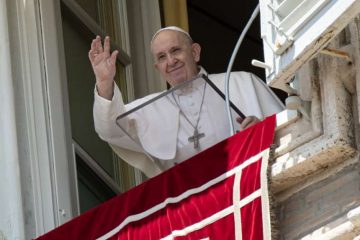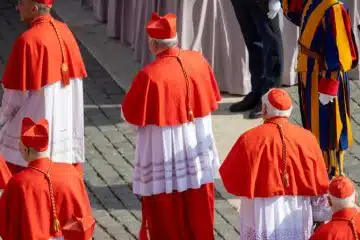A Closer Look by Kenneth Craycraft: Immigration Policy Must Have a Preferential Option for the Alien
Regardless of the political position one advocates, immigration and refugee policy is primarily a moral theological issue. Of course, policy deliberations necessarily involve a number of considerations, including economic, financial and political factors. But, like any moral issue, the primary source for our deliberation should be Catholic moral theology, not partisan political affiliation.
Thus, the Catholic Christian position on immigration policy – or any policy, for that matter – must resist the temptation to subordinate faith to nationalism, partisan political identification or any other cultural consideration. Our Christian faith transcends and relativizes these identifications and commitments. Thus, the primary question is: What is the prudent way of ordering policy toward charity, the form of all the virtues?
While other considerations cannot be disregarded, they are subject to prudential judgments ordered by love. As the Catechism states, “The common good concerns the life of all. It calls for prudence . . . from those who exercise the office of authority. . . . The order of things must be subordinate to the order of persons, and not the other way around. This order is . . . animated by love.” (CCC 1906, 1912)
Specific to this discussion, two complementary theological positions apply: The universality (or “catholicity”) of the Church and the Christian mandate (rooted in the story of Israel) to welcome the stranger among us.
The “Catholicity” of the Church
Perhaps no issue forces us to think more carefully and deeply about what it means to be members of the universal Church than does immigration. Or at least it should if we take the “catholicity” of the Church seriously. As Catholics, our principle identity is not determined by ethnicity, language, race, nationality, country of residence, or any other constraining characteristic. Rather, it is defined in terms of our citizenship in the universal Church. As such, our primary compatriots are not those with whom we share demographic characteristics, but rather those with whom we share Christian faith. Our membership in the universal Church, the body of Christ, subordinates and relativizes all other identifications.
This does not imply that we deny or renounce other identifying characteristics, of course, or that it is improper to embrace and celebrate them. But it does mean that we should not define our primary moral commitments, or examine possible policy positions, in those terms or by those characteristics. Therefore, we do not consider immigration and refugee policy in terms of protecting or advancing national interests, but rather in terms of advancing the universal – the “catholic” – mandate to love our neighbor. We achieve this interest by solidarity and commitment to common good, two of the foundational principles of Catholic Social Doctrine.
Welcoming the Stranger
Closely related to our citizenship in a universal Church is our commitment to welcome the stranger, whether an immigrant or refugee. In one sense, as fellow citizens of the universal Church, no Christians are strangers to us. We share a common kinship in the heavenly kingdom. Additionally, we have a strong, clear biblical mandate to welcome the alien, and to treat the immigrant and refugee as one of us, regardless of his relationship to the Church. In fact, the mandate specifically contemplates that the stranger we must welcome may not be one of us: “So you too should love the resident alien, for that is what you were in the land of Egypt,” declares Deuteronomy. And Leviticus adds, “You shall treat the alien who resides with you no differently than the natives born among you.” And, of course, Jesus tells us in the Gospel of Matthew that when we welcome the stranger, we welcome Him.
Practical Applications
This is all fine in theory, but how does it work in the practical reality of too many people trying to crowd into too small of a space in too short a time? What do we do in the face of finite resources and imperfect legal and political systems? This is where our policy decisions are also informed by economic, financial, political, and cultural considerations. While we have a mandate to welcome the stranger, we also have a duty to the common good, which encompasses the well-being of both the native and the immigrant. This involves the consideration of many factors, including both the conditions of the nation from which the migrant comes, and the ability of the destination nation to care for the good of all.
In addition, we must consider the distinction between the political or religious refugee, on the one hand, and the economic immigrant on the other. While the distinction is often fine and difficult to discern, policy informed by charity will give special consideration to the refugee fleeing persecution over the immigrant seeking improved economic status. Of course, the latter is often fleeing extreme poverty and oppressive economic policies. But all other things being equal, we must give priority to the person whose life is threatened over the one whose wealth is imperiled.
Ordering policy considerations by love is not an American idea; it is a Christian idea. And while it might sound odd – even alien – in American political discourse, it reminds us that we are all strangers in a strange land. And in that very strangeness is our mandate to have a preferential option for the alien, whether immigrant or refugee, without regard to partisan political
identification.
 Kenneth Craycraft is an attorney and Associate Professor of Moral Theology at Mount St. Mary’s Seminary/ The Athenaeum of Ohio. He holds a Ph.D. in moral theology from Boston College, and a J.D. from Duke University School of Law. Dr. Craycraft and his wife, Sue, have nine children, and four grandchildren.
Kenneth Craycraft is an attorney and Associate Professor of Moral Theology at Mount St. Mary’s Seminary/ The Athenaeum of Ohio. He holds a Ph.D. in moral theology from Boston College, and a J.D. from Duke University School of Law. Dr. Craycraft and his wife, Sue, have nine children, and four grandchildren.













